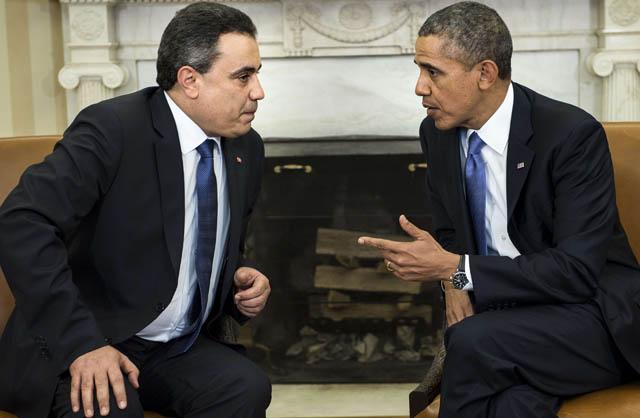You are here
Tunisia treads path to political stability but still faces tests
By Reuters - Apr 06,2014 - Last updated at Apr 06,2014
TUNIS — Three years after its uprising that inspired the Arab Spring revolutions, Tunisia is on its way to political stability with a new constitution and the promise of elections later this year.
At the same time the country’s caretaker government, led by Prime Minister Mehdi Jomaa, is conscious that some real social challenges lie ahead.
Jomaa, a former aerospace executive who worked in France, warned Tunisians last month that they must make “painful sacrifices” to revive the economy.
Tunisia’s budget deficit is set to grow to 8 per cent of the gross domestic product this year, mostly due to public worker wage costs and subsidies which are a hangover from former Tunisian autocrat Zine El Abidine Ben Ali ousted in 2011.
Jomaa’s challenge is how to cut government costs without triggering the kind of discontent that toppled Ben Ali, whose overthrow was caused partly by grievances over unemployment and high costs that are still very real for many Tunisians.
The technocrat government headed by Jomaa took over two months ago after an accord between the two main political poles — the Islamist Ennahda Party and its secular opponents — that ended a political standoff and cleared the path for elections.
Jomaa last month announced external borrowing needs for this year would be $8 billion — nearly double the initial estimate in the government’s budget plan.
Just last year, an attempt to increase a vehicle tax showed how sensitive subsidy and financial austerity reforms can be. The announcement triggered rioting and clashes that forced the previous government to reverse its decision.
“We know very well there is social tension in the country, but we should move forward with reforms to restore the balance of the Tunisian economy,” Finance Minister Hakim Ben Hamouda told journalists last week after meeting with an IMF delegation.
Sensitive to past tensions, the minister avoided setting a date to raise fuel prices and tackling other subsidies that balloon the state’s spending bill but help poorer Tunisians.
With few hydrocarbon reserves unlike its rich neighbours Algeria and Libya, Tunisia relies heavily on foreign tourism and remittances from Tunisians living overseas.
Political stability has opened up the door to credits and aid like $500 million in US loan guarantees and financing from the IMF, World Bank, European Union and the Japanese government — a total of $3.2 billion in packages.
Steady, painful measures
But Jomaa’s government is under pressure from international lenders to take hard steps to curb public expenditure — fuel subsidies, public wage bills and transport subsidies, all politically sensitive.
One government source told Reuters that a 6 per cent increase in domestic fuel prices may be introduced in July this year.
Industry Minister Kamel Ben Nasr has said planned fuel price hikes will provide the government with an extra 350 million dinars or around $220 million this year.
He told the state news agency TAP that Tunisia’s government is looking to reduce energy subsidies from 3.6 billion Tunisian dinars ($2.26 billion) in 2013 to 2.5 billion Tunisian dinars ($1.57 billion) this year.
This year the government has already cut energy subsidies for cement companies by 50 per cent and will cut them by 100 per cent next June.
It also plans to reduce fuel subsidies for sectors including food industry and textiles, which will bring 420 million Tunisian dinars ($263.83 million) to state coffers.
Public transport prices will rise as part of plans to offset losses of public transport companies from fuel increases.
But with Tunisia preparing for elections later this year — its first ballot under a new constitution and its second only free election — those reforms may carry political cost.
“It is a delicate balance. Tunisian purchasing power worsened remarkably due to the increasing of inflation, but the government is forced to make immediate reforms,” said Ezzidine Saidaane, a local economic expert.
Saidanne expects Jomaa’s government will look to cut subsidies on food items, fuel prices and cooking gas, but it will not include bread prices, which would be too sensitive. In 1984, dozens were killed in rioting over a bread price hike.
Preparing to ward off potential protests over price increases, last week the government began negotiations with Tunisia’s powerful labour union federation the UGTT.
But in a country where many still complain they have yet to see the economic benefits of their “Jasmine Revolution”, getting those reforms done may come at a price.
“We can’t accept an increase in gasoline or food prices,” said Salem Rbihi, a truck driver in Tunis. “Beware of our anger, I tell the government, because a second revolution will be on its way, and it will be harder, a revolution of the hungry.”
Related Articles
The United States and Tunisia signed this week a $500 million loan guarantee agreement that will help Tunisia raise money at affordable rates from commercial capital markets.
President Barack Obama on Friday praised Tunisia as the poster child of the Arab Spring, as Washington unveiled half a billion dollars in loan guarantees during the visit of Prime Minister Mehdi Jomaa.
Tunisia’s outgoing government said on Thursday it had suspended planned energy price hikes, its second policy reversal in two weeks after popular protests forced it to scrap a tax increase envisaged under its 2014 budget.















